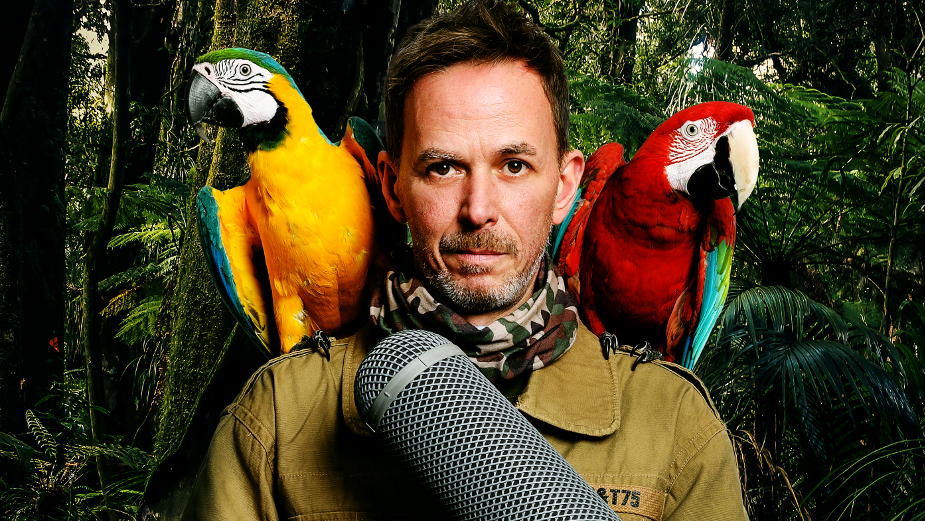
Chris Turner Sounds Off: Lost and Found

I’m a bit OCD, so I have specific pockets for everything: keys, wallet, phone, gloves, notes, tissues...
And I think losing things is a bad omen. Which is why the last time I lost my keys I refused to go on holiday the next day.
My wife, however, loses everything, and there’s a constant stream of “can you call my phone, have you seen my so and so, where’s my X,Y or Z...?”
But, when she loses her keys, she says, “I need a holiday, I just can’t focus at the moment!”
I guess everyone feels differently about losing things.
But sometimes we say we’ve lost something when in reality it’s actually been snatched away - a loved one, a job. Or even our hearing. Roger McGough summed it up perfectly in his poem 'The Sound Collector':
A stranger called this morning
Dressed all in black and grey
Put every sound into a bag
And carried them away
The whistling of the kettle
The turning of the lock
The purring of the kitten
The ticking of the clock
The popping of the toaster
The crunching of the flakes
When you spread the marmalade
The scraping noise it makes
The hissing of the frying pan
The ticking of the grill
The bubbling of the bathtub
As it starts to fill
The drumming of the raindrops
On the windowpane
When you do the washing-up
The gurgle of the drain
The crying of the baby
The squeaking of the chair
The swishing of the curtain
The creaking of the stair
A stranger called this morning
He didn't leave his name
Left us only silence
Life will never be the same
Two years ago I wanted to document the many ways in which the power of sound has transformed and shaped people’s lives. I also wanted to explore the science behind it - and it became a very interesting project. One evening I found myself chatting to a couple of people about what I’d been up to when one of them suggested I may be interested in a book by their sister entitled ‘Sound: A Story of Hearing Lost and Found’.
And that’s how I found myself having the following conversation with author Bella Bathurst:
Chris: Nice to meet you.
Bella: Very nice to meet you too.
Chris: The book you’ve written profoundly demonstrates the power of sound, so tell me more about it.
Bella: Well, what was important about writing the book was that for the period of time that I was deaf. I thought I was completely on my own. I lost most of my hearing at age 28 and it's a condition that you see exclusively advertised by OAP’s, which when you're 28 is slightly discouraging. If you look at hearing aid adverts it’s all about making them totally invisible - there's a huge stigma about it. If you wear your hair long or have very discreet in-ear hearing aids there's no way that anybody else can see that you have hearing loss. Whereas if you are a bit short or long sighted, there are plenty of other people wandering around with glasses on.
Bella explained that in 1997 she began to suffer hearing loss and her work as a journalist became almost impossible because she was struggling to hear and understand the people she was interviewing. Instead she took a job in a photographic lab and played to her visual strengths, but as her hearing deteriorated further it also began to affect her social life and she became isolated and depressed.
‘I fought the deafness - and myself - for as long as I could. Then I just got sad, and all the other nightmares came to stay.’
Her book is part autobiographical and part an investigation into the science of sound and deafness. She interviews the people most at risk from hearing loss caused by their jobs - musicians, factory workers and even the military.
‘Most people lose their hearing painlessly. It takes itself away a molecule at a time, fading out like the last contrails of a song, and its slow departure probably won’t even be noticeable until it’s too late.’
Bella’s book is exceptional and I loved reading it. Hearing Bella tell her story first hand made me feel incredibly lucky and made me realise why sometimes Audio Books deliver something the printed word can’t - the changes in her intonation, the long meaningful pauses (where a comma on a page becomes beautiful musical manuscript), the repetition of certain words to give them extra emphasis and, as she reached the profound climax of this both heart-breaking and heart-warming story, the tremolo in her voice told me she was desperately holding back tears.
What’s amazing about Bella’s story is that after years of suffering in silence her diagnosis changed and Bella was fortunate in discovering that her type of hearing loss was operable. And over a period of time she received cochlear implants, which eventually restored her hearing. Bella’s description of how it felt is inspirational..
‘The music poured in, a great shining river, pounding like a waterfall over every atom in every corner of my being. And as it swept through I could feel, genuinely feel, neutrons and synapses sunk for years into darkness snap back to life.’
Bella’s story has stayed with me ever since and I’ve realised that the relationship I have with sound is so incredibly important to me that the mere thought of losing it would be intolerable. So the next time I lose my keys I’m simply going to count my blessings, leave the house and immerse myself in the sounds around me – whatever they are…
Chris: What’s your favourite sound?
Bella: A cat’s purr because it’s entirely gratuitous. There’s no reason for it, all it does is express pleasure.
Chris: The sound of smiling.
Bella: The sound of smiling, yeah, absolutely.
Chris: It’s been fascinating talking to you, thank you so much.
Bella: Well, thank you.













